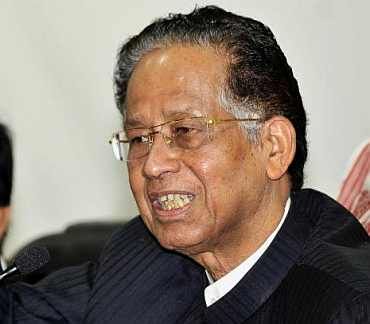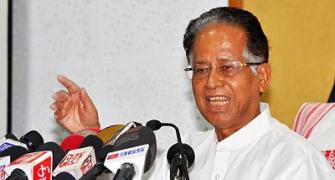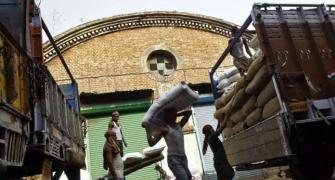 The Congress veteran has led the party to victory thrice. This time, however, the challenge is bigger.
The Congress veteran has led the party to victory thrice. This time, however, the challenge is bigger.
Assam Chief Minister Tarun Gogoi, 79, hopes to lead the party to victory for a fourth straight term in the upcoming assembly polls.
His has been no mean achievement: He took the Congress to victory for the third consecutive time in 2011 and became the chief minister, winning 78 of the 126 seats in the Vidhan Sabha, surprising everyone.
However, ahead of the general elections in 2014, he said if the Congress got less than seven out of 14 Lok Sabha seats, he would quit. When the Congress managed to win only three seats, Gogoi’s detractors, including Himanta Biswa Sarma, reminded the party high command of his vow. However, it was they who left the party later.
This is why the announcement that Gogoi will be the chief ministerial candidate of the Congress in 2016 assembly elections is so mysterious.
It flies in the face of everything the party has been saying -- promote younger people, new thinking, and discourage dynasties.
Gogoi began promoting his son, Gaurav, who became a member of the Congress in 2012. Gaurav contested the constituency in the Lok Sabha elections that had been held by the CM's brother.
In 2010, Gogoi faced serious health problems. He had to undergo complicated cardiac surgery and chatter started about a replacement for him. Now, the announcement that he will be the chief minister if the Congress comes to power in Assam again suggests no replacement is required.
Maybe one of the reasons for the party to prefer Gogoi is that he combines administrative and financial acumen that is rare.
In 2001, when he took charge as the chief minister, the outgoing Asom Gana Parishad government had left the state’s finances in a mess. Militant groups in a neighbouring state were claiming Assam was actually part of Greater Nagaland.
Incessant migration from Bangladesh had prompted then governor, Lt General S K Sinha, to warn the then President K R Narayanan in a report that 57 of Assam’s 126 assembly constituencies had shown more than a 20 per cent increase in the number of voters between 1994 and 1997 whereas the all-India average was only 7.4 per cent, and that the Muslim population in Assam had shown a rise of 77.42 per cent over what it had been in 1971 (there was no census in Assam in 1981).
In 2006, Gogoi became the CM again, largely by dint of putting the finances of the state in order and taking control of law and order. In 2011, he managed to increase the Congress tally.
His greatest challenge in the upcoming assembly election in Assam is how to de-fang Biswa Sarma and the Bharatiya Janata Party; and how to handle the All India United Democratic Front chief Badruddin Ajmal.
Gogoi detests Ajmal’s politics of ghettoisation of the minorities -- but is finding it more and more difficult to counter it.
The good thing about Gogoi is he leaves bureaucrats alone, does not expect them to swear personal commitment to him and is receptive to new ideas in finance and administration.
But, however agile he might be, it goes without saying that age is catching up. It might have been better if instead of putting its eggs in the basket of the ageing warhorse, the Congress had promoted new leadership in consultation with him.










